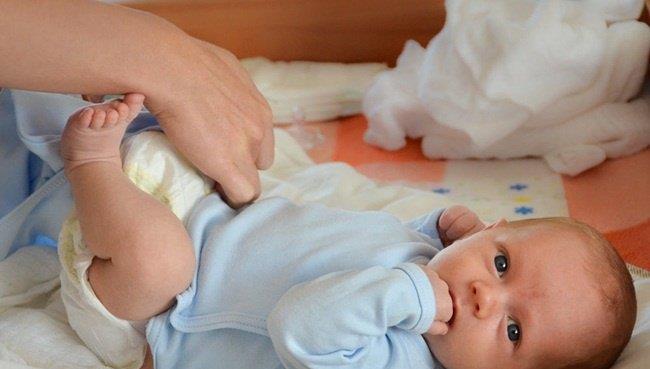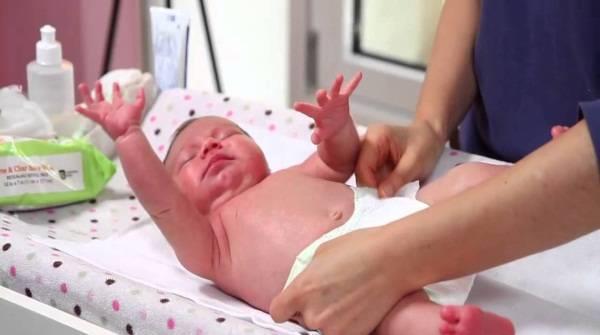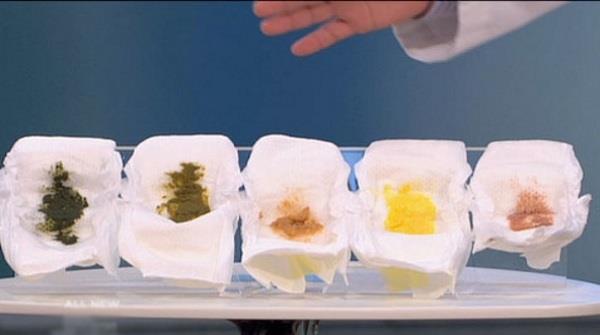In the first days after birth, infant feces are called meconium. Gum stools can be a bit difficult to clean, but the appearance of it is a sign that your baby's digestive system is working properly.
content
How is baby feces normal?
Infant feces when they breastfeed
Your baby's passing cycle can change:
Newborn baby's feces are formula fed
Baby feces when switching from breast milk to formula milk
Feces when the baby starts to eat solids
Newborn babies pass out blood and have strange mucus or color
The child's stool is green and liquid
Children with constipation have bloody stools
Newborn babies have a sour smell
The baby's stools are green
The baby's feces are pale
Babies have black stools
The stools are dark green in color, sticky and sticky. It is made up of mucus, amniotic fluid and everything your baby has digested while lying in the womb. During the process of observing the color of a newborn's stool, the mother can grasp the baby's health as well as detect some children's diseases.
How is baby feces normal?
Infant feces when they breastfeed
Your colostrum, also known as colostrum, has a laxative effect, helping to push the stool out of your baby's body. After about three days of breastfeeding, your baby's stools will gradually change. The stool will:
The color is brighter, changing from brownish green to yellow. This yellow stool can have a slightly sweet smell.
Slightly loose. Occasionally the feces may be lumpy or lumpy.
In the first weeks, babies can defecate while eating or after each meal. On average, your baby will defecate four times a day for the first week. The frequency will gradually decrease and the baby's digestive system will automatically establish a proper cycle. Then you can see that your baby will defecate at the same time of day.
After the first few weeks, some breastfed babies will only defecate once every few days or once a week. This is not a problem as long as the baby's stools are soft and easy to come out.
Your baby's passing cycle can change:
When you feed your baby
If the baby is not feeling well
When your baby starts to suckle less

Based on observations, mothers can tell what the child's stool color says
Newborn baby's feces are formula fed
If you give your baby formula, his stool may be different from that of breastfeeding. You may notice stools:
Much more than breastfed baby feces. This is because formula cannot be fully digested like breast milk.
Light yellow or golden brown.
Smelly, like adult feces.
Babies who drink formula milk are more prone to constipation than breastfed babies. Talk to your doctor if you feel your child has digestive problems.
Baby feces when switching from breast milk to formula milk
You may notice that your baby's stools are darker and more gelatinous. The stools also smell more heavy. If you are switching your baby from breast milk to formula, try to extend the transition, preferably for weeks.
This will give your baby's digestive system time to adapt and help prevent constipation. This process also reduces the mother's risk of pain, swelling and mastitis. Once your baby adjusts to the bottle, he will likely have a whole new cycle of bowel movements.
Feces when the baby starts to eat solids
Weaning will have a great effect on your baby's stool. If you feed your baby carrots, the contents of the diaper will be bright orange.
You may also see fiber-rich foods, such as raisins or baked beans, appear intact in diapers. This will change as the infant's development becomes more pronounced. Your baby can digest fiber more efficiently.
As your baby gets used to a variety of foods, the stools will also become thicker, the color of their stools darker and smelly more.

Each stage of newborn, breastfed or weaned, baby feces are different
Newborn babies pass out blood and have strange mucus or color
The child's stool is green and liquid
This is a sign that your baby may have diarrhea if there are some of the following conditions:
There is phenomenon of babies passing loose stools
Your baby defecated more often and had more stools than usual
Blue baby feces gush out from the anus
If you breastfeed your baby will have less diarrhea, as your milk can help prevent the bacteria from spreading. Babies who drink formula are prone to infections, which is why it is important to sanitize tools and wash hands.
The cause of your baby's diarrhea can be:
Infections, such as gastroenteritis
Too much fruit or fruit juice
Reaction to medication
Food sensitivity or allergy
If you give your baby formula, your baby may react badly to the type of milk you are taking. However, you should talk to your doctor before switching to another formula in case there is another cause.
If your baby is teething, his stool will be looser than usual but will not cause diarrhea. If your baby has diarrhea, don't assume the cause is teething as it is most likely an infection.
In older children, diarrhea can also be a sign of severe constipation. New stools can leak through the hard feces.
Diarrhea usually goes away on its own in 24 hours without treatment. If not, your baby should be tested because he or she is at risk of dehydration. If your baby has had diarrhea 6 times in the past 24 hours see a doctor right away.

Diaper rash complications are scarier than mothers thought All babies have to go through unpleasant moments due to diaper rash symptoms. Her delicate skin was red, itchy, swollen and even bleeding. Hear the child crying that heartbreaking!
Children with constipation have bloody stools
Many children have a purplish red face and press strongly when defecating. This is normal. Infants become constipated when they have the following signs:
Your baby seems to have a really hard time defecating.
The stool is small and dry, like rabbit feces. In addition, the stool can also be large and hard.
Baby seems irritable, tense, and cries while defecating.
The baby's tummy feels stiff to the touch.
Baby feces mixed with blood fibers. This is caused by cracks in the skin, called anal fissures, caused by hard stools.
Breastfed babies are not less likely to experience constipation than babies who drink formula. Breast milk contains all the right nutrients to keep stools soft. Mixing too much formula with too little water can lead to constipation.
Always follow the instructions while preparing formula. Make sure to fill the bottle with the required amount of water before adding the formula.
Constipation can also be caused by:
Fever
Dehydration
Change the amount of water you drink
Change your diet
Certain drugs
Sometimes older children get constipated because they are trying to avoid pain. For example, they may have a tear near the anus (anal fissure). This can become a vicious circle. The child stopped defecating and became more constipated, the pains even worse when the child was forced to defecate.
Always take your baby to see a doctor as soon as he is constipated, especially if there is blood in the stool. Your doctor will check for all possible causes of constipation.
You may be advised to give your baby plenty of fluids and extra fiber (if your baby has weaned). Crushing dried plums or eating apricots for your baby is an effective fiber supplement.

The color of the stool can indicate a baby's health
Newborn babies have a sour smell
The cause of this condition is due to the amount of sugar in milk or the amount of starch in baby foods. The undigested sugar can cause stomach and intestinal irritation, while too much starch in the weaning diet can adversely affect the stomach, causing foamy stools and a sour smell.
If the child goes out about 3 times a day but still gains weight, it is a normal phenomenon. Mother can use digestive enzymes to limit this situation and balance the child's diet.
The baby's stools are green
If you breastfeed, green stools can be a sign that your baby is getting too much lactose (the natural sugar in milk). This can happen if the baby is breastfed regularly, but cannot get the nutrient-rich posterior portion of the milk. Make sure your baby has finished sucking on one breast before switching to the other breast.
If you feed your baby formula, the label you use can turn your baby's stools dark green. You may want to switch to another milk to see if it helps.
If symptoms persist for more than 24 hours see your doctor. The cause could be:
Be sensitive to a food
Side effects of medications
Babies' habits and time to breastfeed
Intestinal bacteria
The baby's feces are pale
Very pale stools can be a sign of jaundice, a common condition in infants. Jaundice causes a baby's skin and whites to turn yellow and usually clear up on their own within a few weeks after birth. Tell your doctor or midwife if your baby has jaundice, even if it seems to be going away.
Also tell your doctor or midwife if your child's stools are very pale, or chalky white. These can be signs of liver problems, especially if the jaundice lasts for two weeks.
Babies have black stools
Baby feces turn from dark green to black if the mother gives the baby more iron. According to the doctors this is completely normal. Only when mothers do not give their children iron supplements and their feces are still black, they need to consult a nutritionist.
A newborn's stool is an important factor for mothers to know how healthy their baby is. In the process of raising children , mothers should carefully observe and monitor when the baby shows unusual signs for a few days in a row!















